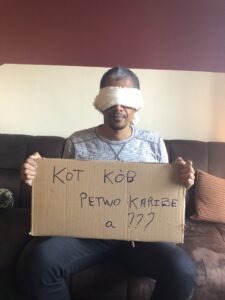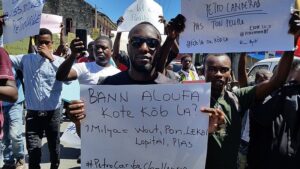Minds of the Movement
An ICNC blog on the people and power of civil resistance
by Gregory François and Jean Sonel BasquinJuly 10, 2020

"Where is the PétroCaribe money???" in Haitian Créole. Source: Twitter user @GibszZZz
On August 14, 2018, Gilbert Mirambeau, a Haitian-Canadian man in his early 30s tweeted a photo of himself blindfolded, holding a sign that said in Haitian Créole: "Kot Kob Petwo Caribe A???" ("Where is the PétroCaribe money???"). The PétroCaribe program was supposed to put money towards development, but those funds went missing, and Mirambeau’s post triggered a nonviolent movement against corruption in Haiti, a country ranked 161st out of 180 countries in the Transparency International Corruption Perceptions Index.
The resulting #PétroCaribeChallenge campaign has been a central feature of Haiti’s anti-corruption movement, still ongoing today. The wave of demonstrations from the north to the south of the country since 2018 has already achieved at least one of the campaign’s interim goals: transparency.
PétroCaribe and the origins of the movement
The PétroCaribe alliance allows countries in the Latin American and Caribbean region to obtain Venezuelan oil on preferential terms. Based on related agreements, resulting savings were expected to be earmarked by national governments to finance infrastructure and social programs. However, the Senate Ethics and Anti-Corruption Committee completed an internal report “confirm[ing], among other things, suspicions of nepotism, prevarication and corruption in the management of the [PétroCaribe] program.” As news of the then-undisclosed report spread in the summer of 2018, young Haitians began mobilizing, primarily through social media using the hashtag #PétroCaribeChallenge but also by organizing demonstrations and sit-ins in the capital Port-au-Prince. Under pressure, the Haitian Superior Court of Auditors and Administrative Disputes (known as CSCCA) published the findings of the PétroCaribe Funds audit 10 days later, on August 24.
According to the audit, from 2008 to 2016, governments in Haiti raised about US$3.8 billion for development infrastructure projects and social programs. These should have facilitated the construction of roads, public hospitals, public universities, schools, public service buildings, and the purchase of medical and paramedical equipment (of no small importance now in the context of the COVID-19 crisis). Very little of this work has been completed, and in many cases, no infrastructure projects exist at all. What’s more, according to the two reports published by the CSCCA on the management of the PétroCaribe fund in Haiti, Haitian leaders deliberately misappropriated and squandered the funds for development projects for their personal benefit.
Prior to #PétroCaribeChallenge, the Haitian people were already fed up with endemic societal corruption, which has kept the country in a socio-economic quagmire since its independence in 1804, as the first black independent nation in the world. Mirambeau’s act only served as a trigger event.
Vision, objectives, tactics

PétroCaribe protest for transparency, September 2018. Source: Manithor/Wikipedia (CC BY-SA 4.0, unedited).
The very first objective of the #PétroCaribeChallenge campaign was to ensure that the government audit reports were made public so as to reveal the squandering of PétroCaribe funds. In addition to transparency, the campaign also demands accountability for those who stole the funds. The campaign’s long-term goal is to end rampant corruption.
During its first rally in Port-au-Prince place in August 2018, in front of the CSCCA, campaign participants demanded the release of the audit and wore T-shirts and signs that had Mirambeau’s symbolic slogan, KOT KOB PETROCARIBE. The CSCCA quickly gave in to this pressure and published the reports, and this early success has set the stage for people to continue to demand government accountability en masse.
Many different segments of the Haitian population domestically and abroad have participated in the movement. Haitian youth have been at the forefront. For example, it was young academics who organized the first sit-in in August 2018. Soon, artists, musicians, painters, and muralists created music and other types of artwork as part of the movement. Carnival season, a major cultural celebration in Haiti each year, has become a time for sharing musical and artistic creations intended to further the movement. Haitians in the diaspora (for example in Miami, New York, Montreal, and Paris) participate virtually, for example by posting photos and videos on social media with the hashtag #PétroCaribeChallenge to show their solidarity with the movement.
Since the early months, campaign tactics have also encompassed:
- Mass demonstrations and marches to raise public awareness of the importance of responsibility and accountability in good governance;
- Disseminating the PétroCaribe Fund's expense reports;
- Pressuring the authorities to demand that they enforce existing laws against corruption in Haiti;
- Adopting the color white as a symbol of purity, signifying that Haiti’s financial affairs must be transparent; and black as a symbol of sadness, signifying Haitians’ deep sorrow about misuse of PétroCaribe funds;
- Investigating and publishing pictures of PétroCaribe-funded projects that are still underway and whose quotes have been overestimated, as well as projects that were supposed to be completed already.
Challenges
One major challenge to the movement has been infiltrators seeking to gather intelligence on activists, as well as agents provocateurs to incite violence during demonstrations. For example, during a peaceful march towards the National Palace on October 17, 2019, the police arrested an armed individual in the crowd who later admitted that he was paid by a corrupt politician to discredit the movement.
Although all #PétroCaribeChallenge actions are always intended as peaceful, the police use often force to disperse the crowd. Sometimes this situation creates a lot of panic in the crowd. According to Human Rights Watch, 34 people were killed and 102 were injured (including 23 police officers) during the February 2019 anti-corruption protests. “Haitian authorities should investigate the use of force by police during these protests, and ensure that any police officer who used excessive force is held accountable,” said José Miguel Vivanco, Human Rights Watch director of the Americas region.
Furthermore, politicians have immense personal influence on everything that happens in the public eye in Haiti. However, involving politicians in the anti-corruption movement would be a very serious mistake, because the population does not trust politicians and it would discredit the movement.
Lack of financial resources represents another challenge. The movement has not garnered the support of local NGOs, nor of international NGOs that are operating in Haiti. It is very difficult to engage the Haitian private sector because in many cases, the lack of responsibility and accountability has allowed corruption to seep into all corners of the island nation. The names of many private enterprises have been referred to in the last two reports revealed to the public.
Recommendations going forward
Some ideas for how to keep the movement strong include:
- Fundraising locally and with the help of Haitian diaspora to finance various activities on the ground;
- Organizing sit-ins, marches, and other kinds of creative civil resistance activities to keep momentum going;
- Providing training sessions to activists and leaders to help them acquire the necessary civil resistance and communication skills;
- Enhancing administrative and operational capacity, for example by electing a management committee to define a precise vision and clear strategies; and
- Building effective political campaigns that will put forward clean candidates to win in local, regional, and national elections.
As #PétroCaribeChallenge breathes down the necks of leaders who thought they could ignore the well-being of their constituencies forever, those leaders are contemplating whether they will be able to renew their mandate. Many Haitians, particularly youth, believe that politicians’ futures in office are dim, because the people have awoken.
But for now, the time has come to question what the next step will be for the movement, because new strategies will be needed to keep the heat on corrupt officials. In particular, pressure will be necessary to ensure that the CSCCA holds accountable those involved in destroying Haitians’ hope for more transparent government and a better future for their families.
Gregory François
Gregory Francois is a Haitian activist and social entrepreneur with a Bachelor’s Degree in legal science from the State University of Haiti. He is a consultant in Community Project Management for several organizations in Haiti and is an engaged citizen against corruption and for the rights of people with disabilities.
Read MoreJean Sonel Basquin
Jean Sonel Basquin, from and based in Haiti, has a degree in development project management and is currently a computer science student. He has worked with young people in the Haitian community for over 15 years, including with the VDH (Volunteers for Development of Haiti). He is an activist in Haiti’s nonviolent struggle for PetroCaribe transparency.
Read More